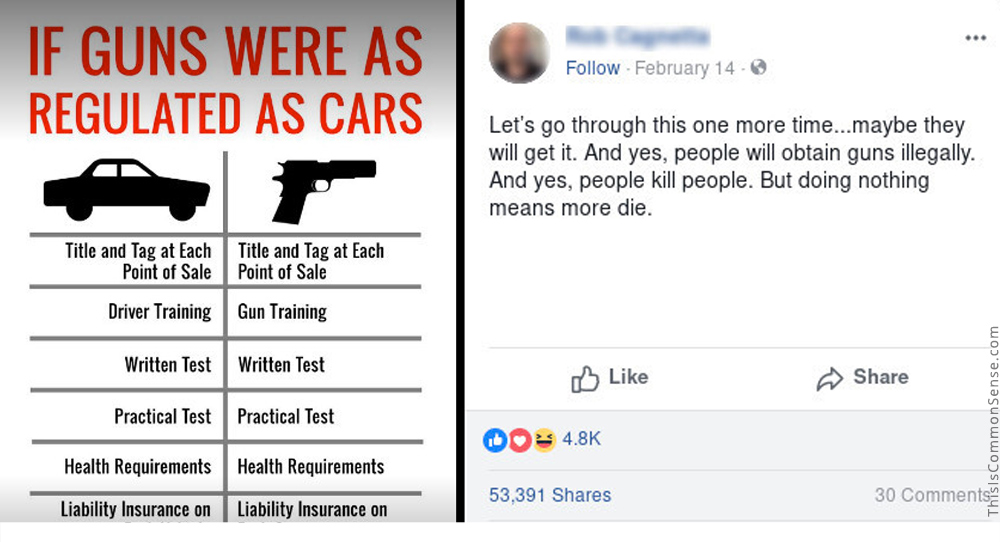A clever “meme” made the rounds earlier this year showing, in two columns, what it would be like were guns regulated like cars.
How reasonable that would be!
“Title and tag at each point of sale”; “Driver training”/“Gun training”; Liability insurance on each vehicle/gun”; etc. It seems sound, no?
No.
The memester failed to address a context: our car and driver regulations apply to vehicles and drivers on government-run roads. On your own property you can drive all sorts of vehicles, unregulated. And it is on their own property that most gun owners’ firearms stay most of the time.
So, treating “guns like cars” would put government deeper into our private affairs.*
The meme came into an economist’s view packaged under the slogan “doing nothing means more people die.” He saw problems. For example, “someone might propose that each person above the age of 10 years old be interned in a mental-health camp, until and unless experts appointed by the state certified that he or she was not a danger to society.”
Same logic — we cannot do nothing, can we?
Another economist dubbed the problem we have identified here as “a simplistic model of public policy.” Policy advocates tend to assume that if you change a policy we get only one effect. Not true.
A third economist (I’m going for a trifecta!) discovered that even adding safety features to cars comes at a cost in human life: feeling safer, drivers compensate … and it is non-drivers who suffer. More drivers hit more pedestrians.
Be cautious when you drive, sure. Be cautious when you shoot, of course.
But be cautious, especially, when you prescribe new laws.
This is Common Sense. I’m Paul Jacob.
* Not to mention that gun rights are specifically enshrined in the Constitution and vehicle rights … not so much.


10 replies on “Simplistically Wrong”
Synchronistically, I was thinking yester-day morning about how if my vote has any efficacy — and I think that it does, albeit of an indirect sort — then it steers the direction of violence, because the state is a violent institution. (Certainly it effects most mass shootings.)
That population of people most inclined to insist on restrictions on the right to keep and bear arms are typically least receptive to restrictions on voting, and are aghast when those restrictions begin to be like the restrictions on driving automobiles on public roads. Plainly though, if we do nothing then more people will die.
Their interest in unrestricted voting only goes until they’re in power. Once in voting will be restricted to Party members only.
Ask those persons if they would agree to the same rules for freedom of speech, ot practice of their religion. Thy will quickly understand the difference between rights and privileges.
The reality is that these persons do not agree with the rights to keep and bare arms because they, unlike the founders, do not believe that the government can turn against them. Really, in light of the evening news? .
Driving is a privilege; bearing arms is a right
Yes, bearing arms is a Right. Curiously, James Madison (principal author of the Constitution), was vehemently opposed to the Bill of Rights because he felt Rights were truly “self-evident” and by writing them down gave the sense they were gov’t granted, not God given.
Per my reading of the 9th Amendment we DO have the Right to drive if it’s on our own property. The CONSTITUTIONAL Right because the 10th says the gov’t has no authority to say otherwise unless my doing so infringes on someone else’s Rights (polluting, excessive noise, etc)
I agree the Ninth Amendment recognizes a right to drive. The fact the roads are government-owned complicates that. So does the lack of respect for the 9th in federal courts.
Ah, yes. Good point. Hadn’t thought of that (private propertydriving)
I’ve owned several guns for years. When I decided I wanted to “carry” I had to take a short safety and rules course and pay a fee. No problem.
Remove the deaths of criminals and the deaths of suicides out of the gun stats and the guns end up very safe. And unlike a car a gun can be used to protect you from those that mean you harm. Pretty sure no one is using a car for that purpose.
Ultimately, cars will not serve as a lost stopgap against a tyrannical central control police state.
Some advocates of gun control argue that one of the benefits would be a drop in suicides. Setting aside the issue of how the right to life could be respected by violating choice, previous experience has shown that removing a means of suicide causes people to adopt other means.